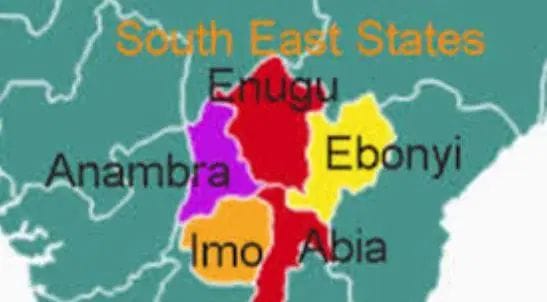The growing insecurity in South East Nigeria has sparked strong reactions from the Human Rights Writers Association of Nigeria (HURIWA). On Wednesday, the group openly condemned the South East governors and political leaders, accusing them of turning a blind eye to the rising violence and unrest across the region. In a statement released in Abuja, HURIWA described the leaders’ actions as careless and irresponsible. According to the group, while insecurity has worsened, the governors have continued to benefit from security funds without doing much to protect the lives and property of their people.
Emmanuel Onwubiko, who serves as HURIWA’s National Coordinator, did not hold back his criticism. He stated that the governors have disappointed the people by refusing to take the necessary steps to stop the wave of crime spreading through the region. He pointed out that, unlike their counterparts in the South West who set up Amotekun to protect their communities, South East leaders have not shown any real commitment to creating a similar regional security outfit.
He stressed that the region is slowly turning into an unsafe and lawless zone. In many areas, unknown gunmen and criminal groups now operate freely, attacking residents without fear. Onwubiko warned that the inaction of the South East governors is giving these groups more power. Many towns and villages have become no-go areas, and the situation keeps getting worse by the day.
People in the South East now live in fear. Businesses are shutting down, and the economy is suffering badly. Regular sit-at-home orders issued by the Indigenous People of Biafra (IPOB) have further crippled movement and trade. Onwubiko said that the Igbo heartland has become a place of fear, with many residents unsure of what the next day will bring. The insecurity has created widespread panic, and many people have left the region in search of safety elsewhere.
According to HURIWA, this crisis shows that both regional and national leaders have failed. The group believes that the silence of these leaders—especially during the sit-at-home days—raises questions about whether they are simply afraid or secretly involved. The fact that government presence is hardly seen on such days only makes things worse. Banks, shops, schools, and transport services all remain closed. This doesn’t happen just because of fear but also because the government has abandoned its responsibility to the people.
HURIWA did not spare the Federal Government either. The group accused the central government of neglect and double standards. A major point of concern is the continued detention of Mazi Nnamdi Kanu, the IPOB leader. Onwubiko stated that the Federal Government’s refusal to release Kanu or to engage in meaningful dialogue is part of the reason why peace has remained elusive in the region. He also pointed out that Igbos have been sidelined in federal appointments and infrastructure development. This exclusion, HURIWA believes, deepens the anger and frustration among people in the South East.
According to security experts quoted by HURIWA, the absence of police and military patrols during high-risk periods like the sit-at-home orders gives the impression that the government has handed over power to criminal groups. This not only weakens public trust in the government but also encourages more lawlessness. For nearly four years, the situation has continued without any serious response from either the federal or state governments. HURIWA warned that this ongoing neglect makes people wonder if there are powerful individuals sponsoring the violence.
The association insists that the only way forward is for leaders in the South East to unite and form a strong, regional security network. This security body must be independent of party politics and should involve local communities. HURIWA believes that if the South West can form Amotekun, the South East can do the same. Such a move will not only help restore public confidence but also improve safety across the region. It would also give residents a sense of ownership and involvement in their own protection.
HURIWA also condemned the activities of some security officers who extort money from drivers and commuters along highways in the region. These illegal acts add more pressure on people who are already suffering from fear, poverty, and insecurity. The group stressed that South East insecurity will only get worse if those in power keep ignoring these issues. They urged security agencies to discipline any officer found guilty of exploiting citizens.
In calling for immediate action, HURIWA reminded South East leaders that they owe it to their people to create a safe and stable society. They warned that history will not forget or forgive those who remained quiet while their communities collapsed into chaos. The time to act is now. Any further delay could cause even more damage to lives, property, and the future of the entire region.
The message from HURIWA is clear: the South East can no longer afford silence and indifference. Leadership comes with responsibility, and the people expect their governors and lawmakers to protect them. They are calling for bold decisions, unity among political leaders, and a serious commitment to solving the security problem once and for all.
In conclusion, South East insecurity is not just a local issue; it has become a regional crisis with national implications. HURIWA has sounded the alarm, and now it is up to both state and federal leaders to respond before the situation becomes completely unmanageable. The safety of the people and the future of the South East depend on it.



